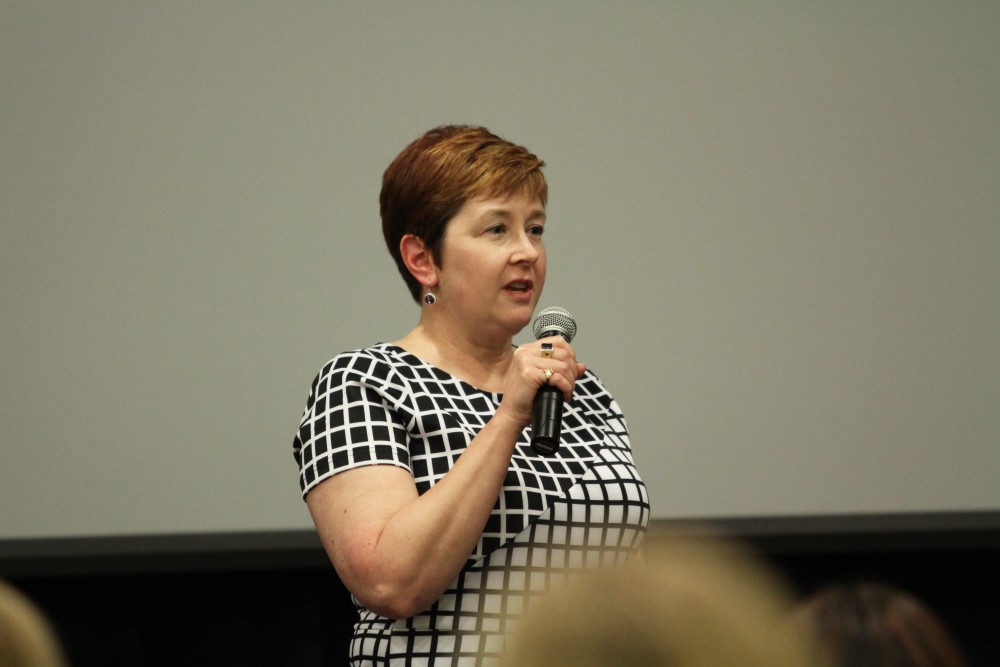‘The Scarlet Cord’ film screening helps students care

Elise Hilton spoke during the Scarlet Cord event held on Feb. 4 in Allendale, MI.
Feb 8, 2016
Activism and awareness concerning sex trafficking in Grand Rapids and the U.S. is being communicated through outlets such as art, film and discussion at Grand Valley State University. However, some GVSU graduate students and sex trafficking victim advocates said it is difficult to cover all aspects of the issue as well as convince students to care.
“Students need to be curious,” said Kumail Lassi, GVSU graduate student and sex trafficking victim advocate. “They need to inquire more about things they don’t know about or things they feel like they can’t learn about or don’t want to learn about. It’s hard to fight apathy.”
A screening of the documentary-style film “The Scarlet Cord” was held on Feb. 4 at GVSU’s Mary Idema Pew Library, sponsored by the Frederik Meijer Honors College, the political science department and the Joseph Stevens Freedom Endowment.
Judge T.J. Ackert spoke about the increase of sex trafficking on a local level, artist Pamela Alderman discussed her experience of depicting sex trafficking during ArtPrize 2014 through her artwork and community member Elise Hilton shared her family’s personal experience with sex trafficking. Following the discussion, the film “The Scarlet Cord” highlighted reactions of those who experienced Alderman’s art installation.
Jeffery Chamberlain, director of the honors college, focused on the options students and community members have to get involved. He said he hoped the audience will take note of other awareness and activism events or become involved with organizations such as Eyes Wide Open or the Women’s Center at GVSU.
“Many of us think (sex trafficking) is something that only happens in other countries,” Chamberlain said. “When it becomes clear that sex trafficking of children takes place right here in Michigan, when people hear the personal stories of people who have been trafficked I think there will be terrible concern. What I hope will happen is that people will do something. There is a student group on campus–International Justice Mission–that works to raise awareness and help reduce this type of trafficking. There are many ways to make a difference.”
Laura Klinger, a GVSU graduate and a sex trafficking victim advocate, and Lassi were both asked to attend the event in case any of the content presented happened to trigger emotional reactions from anyone in the audience who had suffered from abuse. They were there on behalf of GVSU’s Women’s Center.
While Klinger believed the screening and discussion was informational, she wished the discussion would have been more inclusive of other races, genders and sexualities in addition to children that don’t have families to advocate for them.
“This is a really good example of intent versus impact,” Klinger said. “(The speakers) have a really good intent, but I don’t think that the way this (discussion) was constructed was the most effective.”
Klinger said that during the discussion the lesbian, gay, bisexual, transgender, queer and intersex community was mentioned briefly in the context of their high risk of being sex trafficked, but they weren’t a significant part of the conversation.
“If we continue to ignore the issues of (the LGBTQ) community and how our (legal) systems recognize them or don’t recognize them then we’re not going to be able to get to a proportionate (risk percentage),” Lassi said.
Lassi was also disappointed by the lack of students that attended this screening and said that most of the crowd was made up of community members supporting the people that were speaking. Even though he said the conversation about sex trafficking was bigger than what was presented, he wished that students would be more involved.
Ackert, Alderman and Hilton are all active in sex trafficking awareness and during the discussion Alderman mentioned the options and resources available for people that want to get involved.
“It was a real honor to exhibit and present at GVSU. The issue of sex abuse and sex trafficking is very relevant with today’s youth and college students,” Alderman said. “The issue of sex trafficking is on the rise in our culture. It has exploded with the easy access on the internet as children are being sold as easily as one can purchase a pizza.”
A list of precautionary steps concerning sex trafficking were provided in a pamphlet that was passed out at the screening. Alderman encourages others to pledge to do one thing to help protect those at risk of sex trafficking in the “Do 1 Thing Challenge.” For more information visit www.pamelaalderman.com.

























